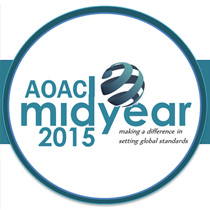 AOAC’s 5th Annual Mid-Year Meeting was held in Gaithersburg, Maryland March 16-20. Stakeholders panels, Working groups and Expert Review panels were working on developing consensus standards, evaluating and recommending the methods as well as identifying and prioritizing issues and needs in areas of Infant and Adult nutrition, food and produce safety and Dietary supplements.
AOAC’s 5th Annual Mid-Year Meeting was held in Gaithersburg, Maryland March 16-20. Stakeholders panels, Working groups and Expert Review panels were working on developing consensus standards, evaluating and recommending the methods as well as identifying and prioritizing issues and needs in areas of Infant and Adult nutrition, food and produce safety and Dietary supplements.
Maria Ofitserova attended the meeting of Stakeholder Panel on Infant Formula and Adult Nutritionals (SPIFAN) where wide range of topics was discussed. The Panel was updated on the state of methods to identify the Whey Protein content in formulas via amino acids analysis and approved Standard Method Performance Requirements (SMPRs) for Vitamins B1, B2, B3 and B6. There was a discussion about the urgent need for methods to determine Sodium Monofluoroacetate (Compound 1080) in response to threats to adulterate baby formula in New Zealand. Sodium Monofluoroacetate is used to control rodents, foxes, rabbits and other animals in Australia and New Zealand and is very toxic. The panel was able to review and approve three fit-for–purpose methods for analysis of Compound 1080. The Panel was also presented with information about harmonization of standards and methods to ensure safety and quality of infant and adult nutritional products and cooperation of AOAC with other organizations responsible for developing International Standards and Guidelines, such as CODEX and ISO.
The full-day session of SPIFAN Expert Review Panel (ERP) was dedicated to reviewing methods seeking to obtain the status of AOAC either First Action or Final Action Official Method.
AOAC Stakeholder Panel on Dietary Supplements (SPDS) launched three new working groups that will be developing Standard Method Performance Requirements for analysis of Aloin in Aloe, Vitamin D in supplements, premixes and raw materials and analysis of different components of tea, including catechins, theaflavins, and special amino acid Theanine. Pickering is especially excited about being part of the Tea working group since we have developed an easy and robust method of analysis for Theanine and tea using cation-exchange column and post-column derivatization with Trione, Ninhydrin reagent.
Pickering Laboratories will continue working with AOAC groups to keep track of important issues in Food analysis and focus our R&D efforts.
- Theanine in Tea
- AAA in Sports Drinks and Supplements
- Afla/Ochratoxins in Herbs
- Antioxidants in Foods and Supplements
- Vitamin B1 in Food and Supplements
- Niacin in Food and Supplements
- Vitmans B1, 2, 3, 6 in Protein Powders and Supplements

